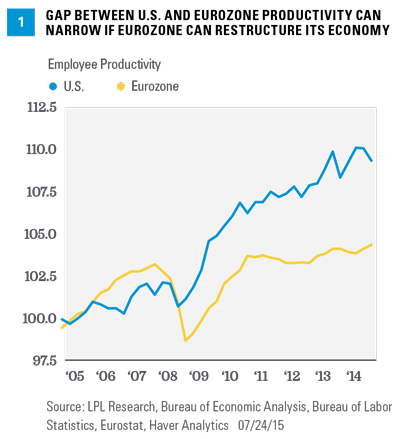KEY TAKEAWAYS
- Although some European countries have made progress with structural reforms, much more work is needed.
- The lack of progress on many structural reforms in countries outside of Germany continues to weigh on the Eurozone’s global competiveness.
- The verdict is still out on Greece and its promised structural reforms.
Click here to download a PDF of this report.
TANGLED UP IN EU
The 50th anniversary of Bob Dylan’s famous appearance at the Newport Folk Festival in Newport, RI in 1965 occurred this past weekend, July 24-25, 2015. Prior to that historic event, Dylan played folk music with an acoustic guitar and a harmonica while performing in concerts. He was generally thought of as a folk singer. At Newport on Saturday, July 24, 1965, Dylan played an all acoustic folk set and was cheered by the audience. On Sunday, July 25, however, he “went electric” by performing three songs (including his just released hit “Like a Rolling Stone”) with a backup band that included an electric guitar, electric bass, and electric organ. The same audience that cheered his performance the day before booed and jeered his electric performance.
During that weekend, Dylan not only reinvented who he was as a performer, he essentially singlehandedly ushered in structural reform to the way popular music, folk music, and certainly, rock and roll music was played, understood, and listened to forever. Less than a year later, in spring 1966, Dylan (an early example of good old American know-how, by the way) exported his new brand of rock and roll in a world tour that ended in Europe and the U.K. By the end of the 1966 world tour, the reforms he had introduced in mid-1965–the key one being that rock and roll music had a message and was more than just loud–had been adapted by musicians, critics, and audiences on both sides of the Atlantic and around the world. His career flourished, and popular music would never be the same again.
WORRIED ABOUT GREECE AND EUROPE? DON’T THINK TWICE, IT’S ALL RIGHT
50 years later, Dylan is still touring and releasing albums, and Europe is still benefiting from good old American know-how. But, now it’s Europe–not rock and roll–that is dealing with structural reform, as it tries to reinvent itself after an uneasy 15 years of a monetary union (the euro) and more than 55 years as an economic union (the European Free Trade Association was founded in 1960). There is much work to be done.
Earlier this month, Greece promised to enact several “structural reform” measures in an effort to reinvent its long suffering economy in return for a third bailout in the past five years from its European partners. Those promises were cheered by Germany, Finland, and northern Europeans, but roundly jeered and booed by citizens in Greece and others in southern Europe. We know how Dylan’s career turned out, but the verdict is still out on Greece and its promised structural reforms.

ALL EUROPE IS NOT DESOLATION ROW
Although Greece and many other parts of Europe may have just started a long-delayed tour toward structural reform, the booing and jeers have given way to cheers and applause in some European countries. In Germany and other northern European countries like Finland, Norway, Denmark, and Sweden, structural reform is a way of life. Flexible labor laws, wage flexibility, breaking up decades-old government and quasi-government monopolies in key industries, U.S.-like bankruptcy laws, reducing regulation, registering property, contract enforceability, etc., are all much more commonplace in these northern European nations than in countries like Greece, Italy, and even France.
BLOWIN’ IN THE HEADWIND: DRAGS ON COMPETITIVENESS
The lack of progress on many of these reforms in countries outside of Germany continues to weigh on the global competiveness of the Eurozone. Figure 1 shows that unit labor costs in the Eurozone remain higher than the U.S., which leads to generally lower profit margins for European companies. Figure 2 shows that gross domestic product (GDP) per capita in the Eurozone remains well below that of the U.S.; and the structural dysfunction means that potential GDP in the Eurozone is consistently below that of the U.S., effectively capping the revenue growth of European companies that do most of their business in Europe. These challenges are evident by the increased gap between U.S. and Eurozone per capita GDP, which has increased from 30% in 1995 to 40% today. Selected countries are ranked by their ease of doing business,* which helps to clarify the scope of the reforms needed. In recent years, countries like Spain, Portugal, and Ireland have taken the difficult steps to enact structural reforms within their economies, and like Dylan, got both cheered and booed as they were rolled out and adapted. While the ease of doing business score for these countries remains well below that of Germany and the U.S., their rankings have moved up over the past half-decade. For example, Spain ranked 49th in 2009 and today ranks 33rd. Portugal went from 48th in 2009 to 25th. Ireland remained in the top tier, but moved from 7th in 2009 to 13th today, above Germany, which is 14th. The U.S., by the way, ranked 3rd in 2009 and is now 7th.


Greece, which has only just begun to move on its promised reforms, stood at 95th in 2009 and has already moved up to 61st, but still ranks near the bottom of its peers in the Eurozone. Italy, 65th in 2009, is now just 56th, and France, at the core of the Eurozone, was ranked 31st in 2009 and maintains that ranking today. Clearly, more works needs to be done to standardize the ease of doing business in the Eurozone so that the 19 Eurozone nations are all close to each other in these rankings, and to raise the overall ease of doing business in the Eurozone. Today, Finland, Ireland, and Germany are all in the top 15 of ease of doing business while Luxembourg (59), Greece (61), Cyprus (64), and Malta (94) are well down the list. Indeed 8 of the 10 worst countries among high-income nations in the ease of doing business rankings are Eurozone nations.
LIKE A ROLLING STONE, BUT MUCH SLOWER
Unfortunately, for many areas in Europe, enacting structural reform is not as simple as plugging in your guitar. It won’t happen in a weekend–as Dylan’s structural change did–or even in a week, a month, or a year. It can take many years, and while some have made progress much more work needs to be done. Stay tuned.
*Ease of starting a business, dealing with construction permits, getting electricity, registering property, getting credit, protecting investors, paying taxes, trading across borders, enforcing contracts, and resolving insolvency (bankruptcy laws).
IMPORTANT DISCLOSURES
The opinions voiced in this material are for general information only and are not intended to provide or be construed as providing specific investment advice or recommendations for your clients. Any economic forecasts set forth may not develop as predicted and there can be no guarantee that strategies promoted will be successful.
Investing in stock includes numerous specific risks including: the fluctuation of dividend, loss of principal and potential illiquidity of the investment in a falling market.
This research material has been prepared by LPL Financial.
To the extent you are receiving investment advice from a separately registered independent investment advisor, please note that LPL Financial is not an affiliate of and makes no representation with respect to such entity.
Not FDIC or NCUA/NCUSIF Insured | No Bank or Credit Union Guarantee | May Lose Value | Not Guaranteed by Any Government Agency | Not a Bank/Credit Union Deposit
Tracking #1-404487 (Exp. 07/16)
